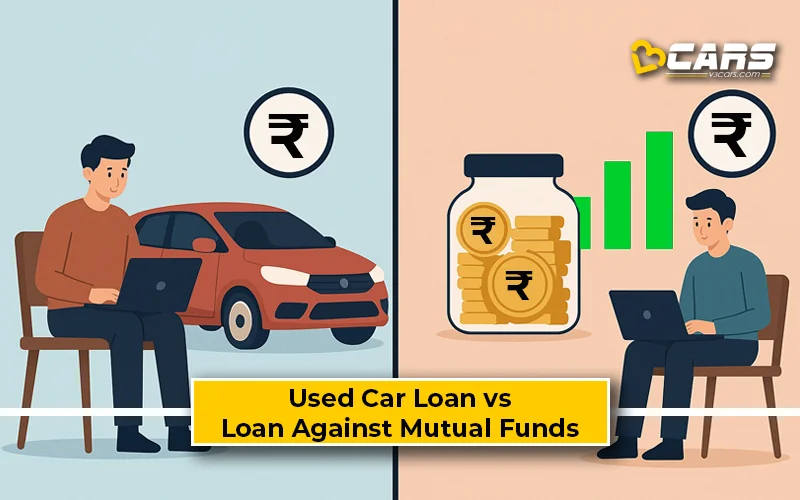Top 5 Myths Busted!! Used Car Loans vs Loan Against Mutual Funds (Sponsored)
While buying a used car, a used car loan might seem like the most obvious choice. But if you are holding assets like mutual funds, then getting a loan against your investment is a smarter choice. And it’s not just because it’s simple and affordable. The real loss is that of opportunity cost. When we asked people in our circle about taking a loan against mutual funds instead of a used car loan, some misconceptions came up. In this article, we’ll bust five such myths.

Let’s start with Myth Number One.
Myth 1: Used Car Loans Are Simple & Affordable (Just Like New Car Loans)
Used car loans are “simple” and “affordable”. Now, most people don’t have experience buying a used car in the first place. So we can’t expect you to have experience with getting a used car loan. People hold a misconception that you can get used car loans just like you get them for new cars. And a loan is a loan, right? If banks are ready to offer loans for new cars at 9-9.5%, they’d probably charge 10-11% for used cars at most.
But that’s not the case at all. Private banks like HDFC start their used car loan rates at around 14%. And that’s for those with an outstanding credit score. For common people you and me, the loan rate is likely to be around 16%. That said, there’s also an option to get a loan at 10.49%, which we’ll discuss later in the article.
On top of that, there’s a hefty penalty of 3-6% if you want to foreclose the loan or make partial pre-payment. Now, the logic behind such a steep penalty for repaying early is beyond my comprehension.
Then there are their fees, such as:
|
|
|
|
|
|
|
|
|
|
|
|
|
|
|
|
|
|
|
|
|
|
|
|
|
|
|
|
|
|
|
|
|
|
|
|
|
|
|
Used car loans from government banks might be slightly cheaper, but people aren’t crazy about chasing government bank jobs for no reason. I’ve had my fair share of chasing govt bank employees back in the day. Sometimes they’ll ask us to refill the form, sometimes they’ll ask us to go to window #5 and on other times, it’s their lunch break. The jokes about government bank employees aren’t just for laughs — there’s truth in them.
Used car loans are neither simple nor affordable. And there’s no correlation between a new car loan and a used car loan.
Myth 2: Loan Against Mutual Funds Means The Lender Can Sell My Shares At Will
In a loan against mutual funds, your mutual funds are pledged with the lender. The lender can only provide you with a loan by holding them as collateral. If the borrower faces difficulty in repaying the loan, the lender has the right to sell the mutual funds to clear the outstanding dues. The condition here is — if — the borrower is unable to repay.
If you’re unable to repay the borrowed amount, you can request Yenmo to sell part or all of your portfolio to settle the loan. Before touching your investments, Yenmo will always send multiple reminders and repayment requests to their customers. To keep your investments compounding, if you can temporarily repay the dues and renew the account for another three years. Once that’s done, you can once again withdraw up to the credit limit.
While the lender has permission to sell your portfolio in a loan against mutual funds, this option is only exercised as an absolute last resort. According to Yenmo, so far, they’ve only had to liquidate funds in less than 0.5% of cases.
Myth 3: Buying A Car With Full Payment Is Financially The Best Option
Whether it’s a new car or a used one, cash has some appeal. As we highlighted in the car buying negotiations article, it helps in bargaining for a better price. In the case of a loan, there’s extra paperwork, and the approval process can take a few days. If it’s a used car loan, it might take even longer. And in that time, if the seller finds another buyer willing to pay more or make a full payment, consider the deal gone.
But debt is sometimes better. Let’s understand this in 3 points:
- Opportunity Cost: Even with reasonable mutual fund returns of, say, 15% per year with quarterly compounding, an initial investment of just 10 lakh, could earn you Rs. 1.8 crore in 20 years and Rs. 8.19 crore in 30 years.
|
|
||
|
|
|
|
|
|
|
|
|
|
|
|
|
|
|
|
|
|
|
|
|
|
|
|
Today, you might think that if you have money in mutual funds, you should sell them and buy a car in cash. By interrupting the compounding of your investments, you may save on the 10-15% interest of a loan. However, over a long investment tenure, you’re losing out on crores in potential earnings. So, taking a loan against your investments from Yenmo is a better option.
- Discipline: Once you get into the habit of earning passively from investments, it’s like a tiger tasting blood. But those obsessed with making quick money won’t get a taste of it. And for this, you need discipline. By curbing spending on small whims or status symbols, you should aim for disciplined wealth creation with an investment horizon measured in decades. Withdrawing investments to buy the latest iPhone or a flashy expensive car will ruin your discipline, and you’ll never experience the joy of compounding.
- Overdraft: Lastly, with a loan against mutual funds, Yenmo offer an overdraft feature. Think of it like a piggy bank from which you can withdraw up to a certain limit whenever you want. You only pay interest on the amount withdrawn and for the duration it’s withdrawn. With this overdraft feature, you can take advantage of bargaining like you would with cash but without selling your portfolio.
Myth 4: You Need A Large Portfolio For MF Loan
Another myth we learned about loans against mutual funds is that you need a large portfolio — at least Rs. 10.0 lakh. Some people even mentioned Rs. 1.0 crore, but Rs. 10.0 lakh was the minimum quoted by many of my friends and colleagues.
We checked with Yenmo and found out that you can take a loan against a mutual fund portfolio as small as 50,000. In the case of debt mutual funds, you can get a loan of up to 80% of the portfolio value, and for equity mutual funds, up to 50%. Now, you can’t buy a car with such small capital but at least this puts cold water on the myth.
Myth 5: I Can’t Continue My Investments If I Pledge My Portfolio
If you take a loan against mutual funds, your investments won’t be able to continue because the mutual fund is now with the lender. During our research for this video, many people highlighted this concern. On the surface, it sounds logical. When the lender has control over your portfolio, how can you continue SIPs or future investments in that account?
But that’s not the case at all! In fact, you can continue your SIPs or lumpsum investments just as you did before. Your investments and the loan process are fully online, and they remain in the same account as before. As long as you’re not defaulting on your borrowings, your portfolio will behave the same way it always has. If, after taking the loan, your portfolio size increases due to additional investments or market movements, this won’t change your overdraft limit or maximum loan eligibility. For that, you’ll need to have your portfolio reappraised.
Recap
With these five myths busted, let’s quickly recap the article.
Used car loans might offer affordability, but you won’t get both ease and affordability together. On the other hand, with a loan against mutual funds, you get both benefits. With Yenmo, you can get a loan against mutual funds at just 10.49% with a flat processing fee of only Rs. 999 plus GST, regardless of the loan amount. And this entire process can be completed on your phone without once stepping out of your home.
The following table presents some features of used car loan from a private and a government bank:
|
|
|
|
|
|
|
|
|
|
|
|
|
|
|
|
|
|
The following table presents the advantages of taking a loan against mutual fund from Yenmo:
|
|
|
|
|
|
|
|
|
|
If you have full payment ready for a car, you get some additional leverage in negotiations, but you can also enjoy this benefit by taking a loan — without liquidating your portfolio. With a loan against mutual funds from Yenmo, you get an overdraft facility, allowing you to borrow only the amount you need and pay interest solely on that amount. Disposing off your mutual funds just to buy a used car in cash and interrupting your compounding investments is not a good option. It impacts your investment discipline, and the potential opportunity cost could be in the crores.
By the way, you don’t need a portfolio worth crores to take a loan against mutual funds. With Yenmo, you can get a loan against a portfolio as small as Rs. 50,000, though you isn’t enough to buy a car.
Lastly, with a loan against mutual funds, you pledge your investments to the lender, but as long as you have no outstanding dues, no one can sell your portfolio. Only in the case of defaults, when a borrower fails to repay despite multiple requests from the lender, will the portfolio need to be liquidated, and even then, only to clear the dues. The rest of the amount from liquidating the portfolio will be paid back to you.
The following table presents a quick comparison between a Used Car Loan and a Loan Against Mutual Funds:
|
|
|
|
|
|
|
|
|
|
|
|
|
|
|
|
|
|
|
|
|
|
|
|
|
|
|
|
|
|
|
|
|
|
|
|
If you don’t have mutual funds, you can watch the following video to learn about other financing options for buying a used car:
And if you’re confused about whether to choose a new or used for your first car, you can check out this video:
Disclaimer: This article is sponsored by Yenmo, the Good Loan Company. For more information, you can visit: https://yenmo.in/ Links to their Android and iOS apps are also in the description. You can support us by checking them out.
If you want to help us, you should consider downloading the Yenmo App and exploring it using the following link: Yenmo — Mutual Funds Loan App
Helpful Links:
Fuel Cost Calculator for Cars – Know your monthly fuel expense based on usage and mileage
Car On-Road Price Calculator – Convert ex-showroom to on-road price for any city
Sell Used Car Online – Enter your car and contact details to get an instant price estimate and book a free inspection with our partner network


0 Comments